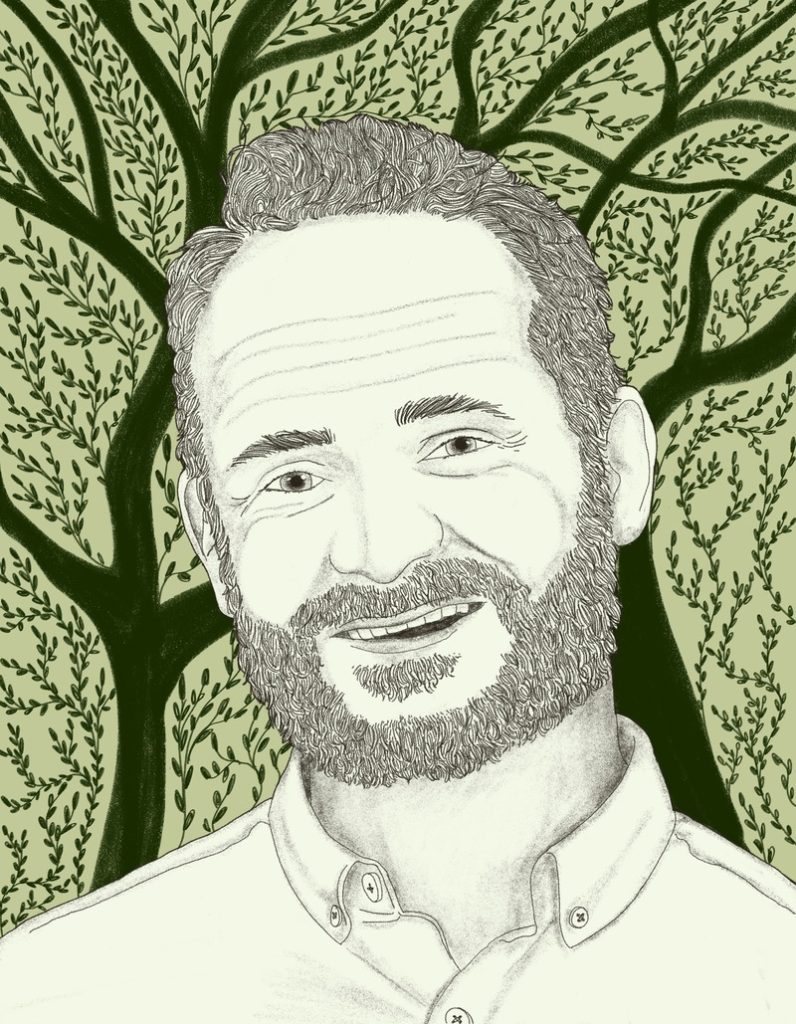
“In my work as a teacher and as a citizen and a writer, I try to be on the side of beauty and connection and less on the side of disconnection and brokenness.”
at the University of the South in Suwanee, Tennessee.
The world is full of sound. Yet we happen to be a species who, at the moment, is directing most of our attention to our own voices and not so much to the voices of other living things. Biologist David George Haskell says this collective inattention is a huge loss for each of us. It’s like leaving money on the table because paying attention to the living world is a source of beauty, joy and renewal—one we can access at anytime from anywhere.
Plus, when we—the most powerful species on the planet—stop listening, the relationship between humans and nature doesn’t exactly go terrifically well. David says, “If I’m not listening to the voices of my kin, the birds and the trees and the living rivers and the whales and neighbors, how can I expect to be a good relative to them? If I’m not listening, how can I expect to be a good member of the living earth community?”
How to Find Out More
Buy and read David’s books. The one we discuss the most in this episode is his most recent one, Sounds Wild and Broken: Sonic Marvels, Evolution’s Creativity, and The Crisis Of Sensory Extinction.
The link will direct you to Amazon, but we’d be remiss not to mention that it’s more fun and aesthetically pleasing for you to buy it at your local bookstore or to ask them to order a copy for you. Or if you don’t have a bookstore near you, try Jill’s favorite shop, the Seminary Coop Books/57th Street Books. You can order from the Coop’s website—and if you live in Chicago in the Hyde Park neighborhood (or somewhere reasonably close by) a nice human being from the store will deliver whatever you order right to your doorstep. The book will arrive without that overeager, heavy-duty packaging that Amazon burdens you with.
Seminary Coop home deliveries have only a wee, barely-measurable environmental footprint, so check it out.
David’s other books are—all of which are excellent—are:
- The Songs of Trees: Stories from Nature’s Great Connectors
- The Forest Unseen: A Year’s Watch in Nature
- Thirteen Ways to Smell a Tree: Getting to Know Trees Through the Language of Scent
Insider bonus tip: if you purchase that last one as an audiobook, it’s accompanied by original violin compositions.
If you’re not really a book person but would like enjoy exploring other small hits of David’s way of thinking and being in other ways, check out what David has composed or collaborated on in other mediums:
The voices of birds and the language of belonging. Emergence Magazine. An article, yes, which means reading—but it also includes an audio essay with bird song.
The Atomic Tree. VR experience based on the last chapter of The Songs of Trees.
Concurrent-Dyscurrent. CD/digital tracks of 4-minute field recording compositions (also on all streaming services).
Eastern Forest Playing Cards, with artist Ellen Litwiller, from The Art of Play.
Credits
In the episode, sounds of the European blackbird singing in a courtyard: Mizu LOEB, XC548553. Accessible at www.xeno-canto.org/548553.
In the episode, we mentioned the organization Noise Free America, a nonprofit organization dedicated to, in their words, “making quiet happen”.
